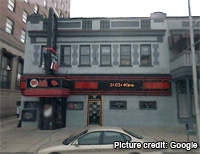 On the agenda for Monday’s City Council meeting is a change to the city’s adult business ordinance that would allow Big Al’s to move to a new location while keeping their “grandfathered in” status. The council communication explains:
On the agenda for Monday’s City Council meeting is a change to the city’s adult business ordinance that would allow Big Al’s to move to a new location while keeping their “grandfathered in” status. The council communication explains:
Since approximately 1978, the City has had an adult business ordinance that restricted the locations of adult businesses by limiting their distances from other adult businesses, from churches and schools, and from residentially zoned properties. There has always been at least one adult business that has not been in compliance with the ordinance but has been grandfathered and, therefore, allowed to continue at its present location. The attached ordinance would allow such a business to relocate, obtain an adult use license for a property which brings the location more into compliance. The relocation may provide an opportunity for the City to take advantage of a significant development opportunity.
In other words, Big Al’s adult use license would follow them to a new location. They wouldn’t have to reapply. And they continue to be “grandfathered in.” Couple this with the liquor license that was requested for 414 NE Hamilton (which the Liquor Commission didn’t approve or deny), and I think you see where this is going.
Once again, oblique reference is made to “a significant development opportunity,” which is rumored to be either an expansion to the Pere Marquette or a new hotel that will be connected to the Civic Center somehow (pedestrian bridge?). In any case, the deal apparently hinges on allowing Big Al’s to move without giving up their adult use license, so the city is doing everything in its power to facilitate that.
I’m concerned that by doing this, the council will be invalidating their adult use ordinance. What I mean is, they’re changing the ordinance to benefit one business. If they do this for one adult business and not another, with no consistent or reasonable justification for such discrimination, the ordinance becomes arbitrary and capricious, and ultimately unconstitutional.
For example, in 2002, the owner of 617 W. Main St., Frank Genusa, also had a grandfathered-in business called Playmate Video. When he changed tenants to a business called The Dungeon Music and Apparel that sold the same kind of adult material, the city revoked his adult use license, saying the grandfathering no longer applies — even though it was the same landlord, the same type of business, and the same location. Don’t get me wrong, I’m glad that place is gone, but you see my point: the rules seem to be rigidly applied to one owner, but easily changed for another.
The next year, the strip club now known as Elliott’s started its effort to get an adult use license at its North University Street location. The city fought that by denying a Class A liquor license for the establishment (a requirement for selling liquor if the establishment also holds an adult-use license). That resulted in a lawsuit that eventually cost the taxpayers several thousand dollars, and they got their liquor license after all. Again, the rules are applied aggressively to one business, but bent and rewritten for another.
Why the double standard? This “significant development opportunity” must be a real doozy. I wonder when the public will be let in on the council’s little secret.

 One of the final steps toward issuing bonds through the Public Building Commission (PBC) for new public school construction will take place Monday night as the Council
One of the final steps toward issuing bonds through the Public Building Commission (PBC) for new public school construction will take place Monday night as the Council